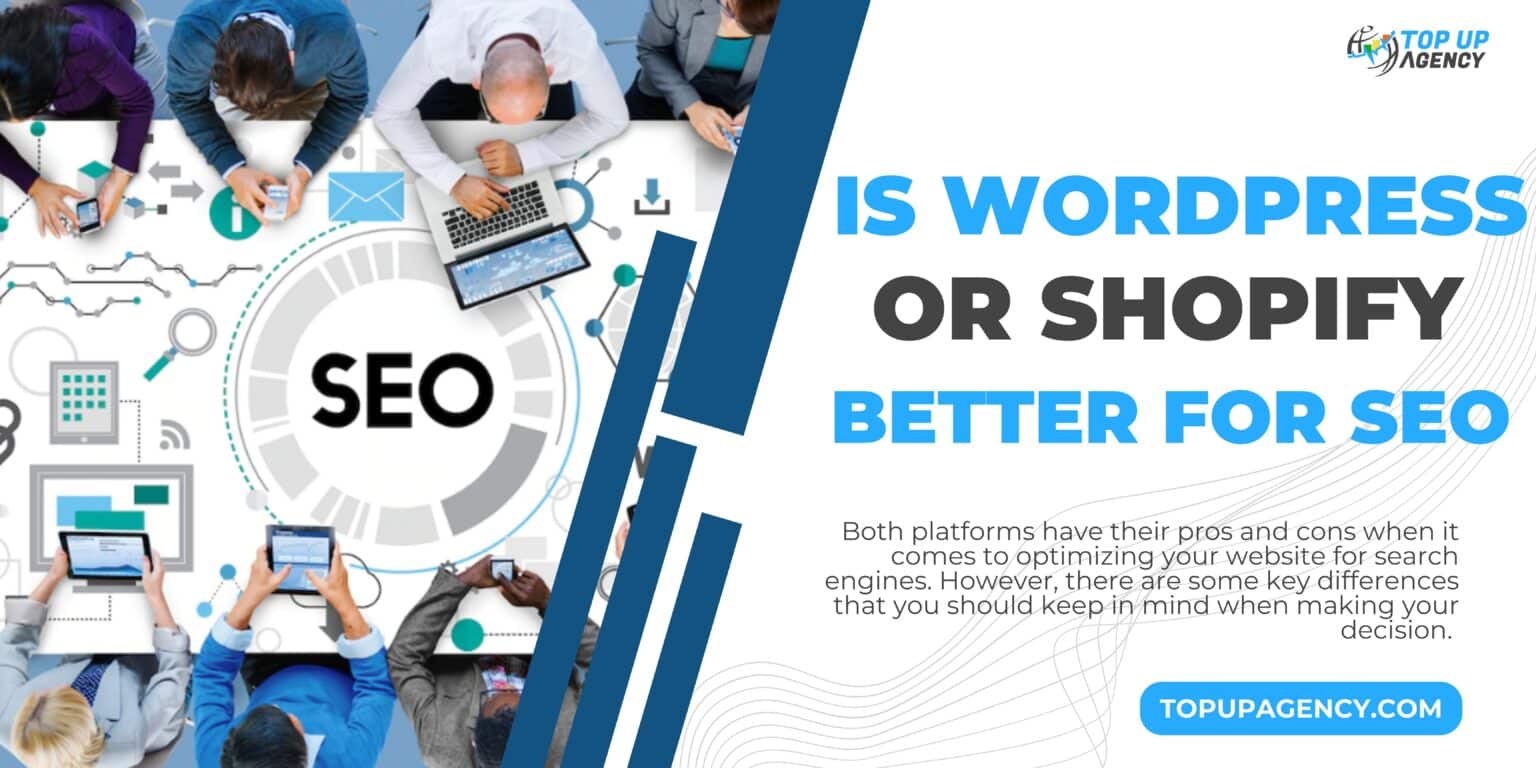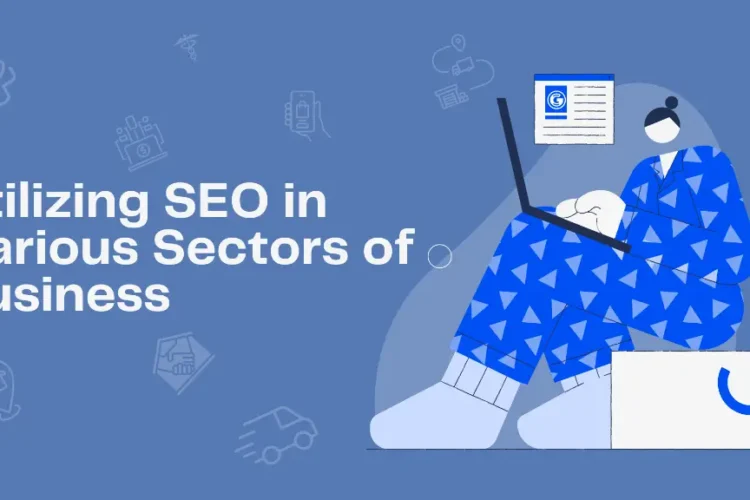
Table of Contents
B Both platforms have their pros and cons when it comes to optimizing your website for search engines. However, there are some key differences that you should keep in mind when making your decision.
WordPress SEO
WordPress is a content management system (CMS) that gives you more control over your website’s code and structure. This can be helpful if you want to make customizations to your site that could improve your SEO.
Shopify SEO
Shopify, on the other hand, is a hosted ecommerce platform. This means that Shopify takes care of all the technical aspects of running an online store so that you can focus on other aspects of your business. While this can be convenient, it also means that you have less control over your site’s code and structure.
So, which platform is better for SEO? It depends on your needs and preferences. WordPress might be the better option for SEO if you want more control over your website’s code and structure. However, if you want a hassle-free platform that takes care of your technical details, then Shopify might be a better choice.
So, which platform is better for SEO? It depends on your needs and preferences. WordPress might be the better option for SEO if you want more control over your website’s code and structure. However, if you want a hassle-free platform that takes care of your technical details, then Shopify might be a better choice.
WordPress SEO Features
WordPress has a series of features that help you to optimize your website as search engine friendly.
- You can customize your URL structure in WordPress, which is essential for optimizing your site for specific keywords.
- With WordPress, you can install plugins to help your SEO efforts. For example, some plugins will help you create XML sitemaps and robots.txt files, as well as ones that will help you optimize your titles and meta descriptions.
- You can also use social media integration to build social signals, which can help improve your SEO.

Shopify SEO Features

Shopify offers several great features for SEO, including:
- Shopify includes built-in support for canonical URLs out of the box. This helps prevent duplicate content issues, which can harm your SEO efforts.
- The platform also automatically generates an XML sitemap, making it easier for search engines to index your pages.
- In addition, Shopify allows you to easily edit your page titles and meta descriptions from within the platform interface.
WordPress SEO
WordPress is a much better platform for SEO. The SEO options in WordPress are more optimized than in Shopify.You can set your SEO Goals and start optimizing your wordpress website. Many of the wordpress plugins help you to optimize the content into a website.
One crucial factor to consider is whether you want to be able to customize your website’s SEO settings.
Another essential thing to remember is that WordPress is a self-hosted platform, which means you’ll need to take care of things like updates and security yourself. With Shopify, on the other hand, these tasks are handled by the platform itself. This can be either a pro or a con depending on your comfort level with managing these things yourself.
Finally, it’s worth considering whether you want access to many plugins and themes. WordPress has a much larger ecosystem than Shopify, which means more options are available for customizing and optimizing your website for SEO.
Pros of WordPress SEO
- WordPress is an excellent platform for SEO because it is highly customizable. You can add plugins to optimize your website for search engines, and plenty of themes are designed with SEO in mind.
- WordPress is also straightforward to use, even for beginners. There is no need to hire a developer or designer to make changes to your website – you can do it all yourself!
- WordPress is search engine friendly right out of the box.
- You can easily add plugins to improve your site’s SEO.
- WordPress has a large community of developers who constantly create new themes and plugins to improve the platform.
- You can control every aspect of your website’s design and code, allowing you complete freedom to optimize your site for search engines.
- WordPress sites load faster than Shopify stores due to the lighter codebase. This can be further improved by using caching plugins and other speed optimization techniques.
- Because WordPress is such a popular platform, plenty of resources are available online to help you learn how to use it effectively for SEO purposes.
Cons of WordPress SEO
There are a few potential drawbacks to using WordPress for SEO purposes. First, because WordPress is a CMS, it can be challenging to control your website’s structure. This can make it hard to create pages with the correct hierarchy and silo your content correctly.
Second, WordPress can be slow. This is partly due to its flexibility – because there are so many ways to customize WordPress, it can take longer for pages to load. This can be a particular problem if you have a lot of plugins or a complex theme.
Third, while many SEO-friendly features are built into WordPress, some can hurt your ranking if not used correctly. For example, how WordPress generates permalinks (URLs) by default can lead to duplicate content issues.
Finally, because WordPress is so popular, it’s often the target of hackers. While there are ways to secure your site, knowing that this is a potential issue when using WordPress for SEO is essential.
Shopify SEO
Shopify is an SEO-friendly platform. You can enhance your website’s Search engine optimization with many apps and add-ons in the Shopify store. Shopify is capable of helping you achieve good SEO results. Here are some general tips for optimizing your site regardless of which platform you use:
- 1. Use keyword-rich titles and descriptions.
- 2. Create content that is informative and engaging.
- 3. Make sure your website is mobile-friendly.
- 4. Use social media to promote your content.
- 5. Monitor your SEO progress and make changes as needed.
Pros of Shopify SEO
When it comes to SEO, both WordPress and Shopify are great choices. Here are some of the pros of using Shopify for your SEO:
Shopify is a hosted platform, which means that all of the technical aspects of running your website are taken care of for you. This can be a significant advantage in SEO, as it frees up your time to focus on other aspects of your marketing strategy.
Shopify is also designed to be very user-friendly and easy to use, even for those with no prior experience. This can be helpful when it comes to optimizing your website for search engines, as you will only have to spend as much time learning how to use the platform.
Shopify also offers a wide range of features and plugins to help you with your SEO efforts. For example, some plugins can help you generate sitemaps, create meta tags, and optimize your website for mobile search. There are also many eCommerce-specific SEO features built into the platform, such as automatic redirects for products that are out of stock and breadcrumb navigation.
Cons of Shopify SEO
There are a few potential downsides to using Shopify for SEO purposes. First, because Shopify is a hosted platform, you would need more control over your website’s code if you were using a self-hosted platform like WordPress. Implementing specific SEO strategies, such as on-page optimization, can make it easier.
Second, Shopify’s templating system can also be a disadvantage regarding SEO. If you’re not careful, your Shopify template can generate duplicate content, hurting your search engine rankings.
Finally, because Shopify is a relatively new platform, less information about optimizing your site for search engines is available. While there are plenty of resources available for WordPress SEO, you may have to do more digging to find information about Shopify SEO.
SEO-friendly platform
Key things to watch out for when choosing an SEO-friendly platform
When choosing an SEO-friendly platform, there are a few key things to remember:
- The platform should allow you to add and edit page title tags and meta descriptions easily.
- The platform should generate sitemaps automatically to help Google index your pages.
- Platform should allow you to access Robot.txt file
- The Platform allows you to optimize your website for better performance like website speed, SEO Structure, and other technical things.
- The platform should provide easy access to Google Analytics so that you can track your progress over time.
Ability to customize
When it comes to SEO, the ability to customize is essential. With WordPress, you can customize your site for better SEO with plugins and themes. Shopify also allows for some customization, but less than WordPress. WordPress is the better option if you’re looking for complete control over your SEO.
URL structure
If you’re wondering whether WordPress or Shopify is better for SEO, it’s essential to understand URL structure’s role in search engine optimization.
A well-structured URL makes it easy for search engines to index your content and understand what your page is about. It also makes it easier for users to navigate your website.
WordPress automatically generates a clean, SEO-friendly URL structure for all your pages and posts. You can also customize your permalinks to optimize your URLs even further.
On the other hand, Shopify uses a different URL structure for its products, collections, and blog posts. While this can be advantageous for some keywords, it can also make gaining traction for other keywords more difficult.
Ultimately, the best URL structure for SEO is the one that makes the most sense for your website and your users.
Mobile customization
Mobile devices are becoming increasingly popular, and people are using them to access the internet more and more. This means businesses must have a website optimized for mobile devices.
Two main ways to make a website mobile-friendly are responsive design and a dedicated mobile site. Responsive design is where the website automatically adjusts to fit the screen size of the device it is being viewed on. Reliable mobile sites are separate website versions explicitly designed for mobile devices.
Both Shopify and WordPress offer options for creating a mobile-friendly website. With Shopify, you can choose from several themes that are designed to be responsive, or you can create a dedicated mobile site using the Shopify Mobile app. WordPress has several responsive themes available, and some plugins can create a dedicated mobile site.
Which option is better for SEO? That depends on several factors, including your business goals and the preferences of your target audience. If you want to ensure that your website is accessible to as many people as possible, then a responsive design is probably the best option. If you’re primarily focused on ranking well in search engines, then a dedicated mobile site could give you an edge over other websites that aren’t optimized for mobile devices.
Which platform should you choose for your business?
There are a lot of factors to consider when choosing a platform for your business in Shopify VS WordPress, and SEO is just one of them. Suppose you’re looking for the best possible SEO for your store. In that case, you’ll want to choose a platform specifically designed for ecommerce stores with all the necessary features and plugins to support an effective SEO strategy.
Shopify is one such platform. It’s a fully-fledged ecommerce solution with everything you need to optimize your store for search engines. Plus, it’s easy to use and has a wide range of themes and plugins, so you can tailor your store exactly how you want it.
WordPress is another popular option for businesses. it’s still a powerful CMS that can create a fantastic online store. And with the right plugins and themes, you can also make WordPress work well for your business’s SEO.
Your can Select your favorite plateform as the requirements of your business prospective
internal search feature and proper indexation
When it comes to SEO, both WordPress and Shopify are great options. However, critical differences between the two platforms can impact your SEO strategy. One of the most important factors is how each platform handles internal search and indexation.
WordPress offers an excellent internal search feature that makes it easy for users to find the content they’re looking for on your site. However, this feature has its drawbacks. One downside is that WordPress does not index all of your content by default. This means that some of your pages and posts may only appear in search results if you add them to the WordPress index.
On the other hand, Shopify does a great job of automatically indexing your content. This makes it much easier for users to find what they’re looking for on your site and can also help improve your overall SEO. However, one drawback of Shopify’s indexation is that it can sometimes take a while for new content to be indexed by the platform.
Overall, both WordPress and Shopify offer great options for SEO. The best platform for you will ultimately depend on your specific needs and goals. WordPress may be the better option if you need a platform that offers more control over internal search and indexation. However, if you want a platform that will automatically index all of your content, then Shopify may be the better choice.
FAQS About WordPress and Shopify SEO
Shopify offers built-in tools to help you with keyword research and creating optimized title tags and meta descriptions - two crucial elements of on-page SEO. If you're looking for a platform that will give you an edge in the SEO department, Shopify is the way to go.
Yes, WordPress is still the best for SEO. It is constantly updated with new features and plugins to help you rank higher in search engines.
WordPress and Shopify are both great platforms for SEO. They both offer a variety of plugins and themes to choose from, which can help you customize your site to boost your SEO. However, critical differences between the two platforms can impact your SEO strategy.
Shopify is a paid platform, so you'll need to budget for your overall marketing costs. WordPress is free to use, but you may need to invest in some premium plugins or themes to get the most out of it.
Shopify offers built-in support for ecommerce features like product pages and shopping carts, while WordPress requires you to install third-party plugins to add these features. This can impact your site's speed and performance, affecting your SEO ranking.
WordPress and Shopify are excellent choices for businesses looking to improve their SEO. It's essential to carefully consider your needs and budget when choosing a platform, as this will help you determine which is correct.
WordPress is known for its speed and efficiency. WordPress is faster than Shopify in terms of loading time and page speed. One study showed that WordPress sites load, on average, 1.5 seconds faster than Shopify sites. That might not seem like much, but it can make a big difference in terms of user experience and search engine optimization (SEO).



